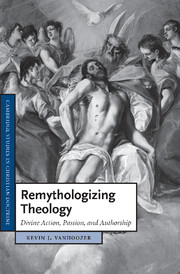Book contents
- Frontmatter
- Contents
- Preface
- Introduction: What is remythologizing?
- Part I “God” in Scripture and theology
- Part II Communicative theism and the triune God
- Part III God and World: authorial action and interaction
- Conclusion: Always remythologizing? Answering to the Holy Author in our midst
- Select bibliography
- Index of subjects
- Index of scriptural references
Part II - Communicative theism and the triune God
Published online by Cambridge University Press: 04 May 2010
- Frontmatter
- Contents
- Preface
- Introduction: What is remythologizing?
- Part I “God” in Scripture and theology
- Part II Communicative theism and the triune God
- Part III God and World: authorial action and interaction
- Conclusion: Always remythologizing? Answering to the Holy Author in our midst
- Select bibliography
- Index of subjects
- Index of scriptural references
Summary
Some theologians suggest that we should always hear the voice of the poor in the biblical text or the voice of women, or the voice of whoever happens to be reading it at the time, since all reading is contextual and thus socially constructed. While it is true that the Bible is full of many voices … the one voice that is silenced by these theologians is the very voice of God.
– Stephen H. Webb, The Divine Voice, p. 166God's works are his words … his doing is identical with his speaking.
– Luther, as cited by Wilhelm Pauck's introduction to LCC edn. of Luther's Lectures on Romans (taken from WA vol. III, 154, 7)To be means to communicate.
– Bakhtin, Problems of Dostoevsky's Poetics, p. 287- Type
- Chapter
- Information
- Remythologizing TheologyDivine Action, Passion, and Authorship, pp. 179 - 180Publisher: Cambridge University PressPrint publication year: 2010

